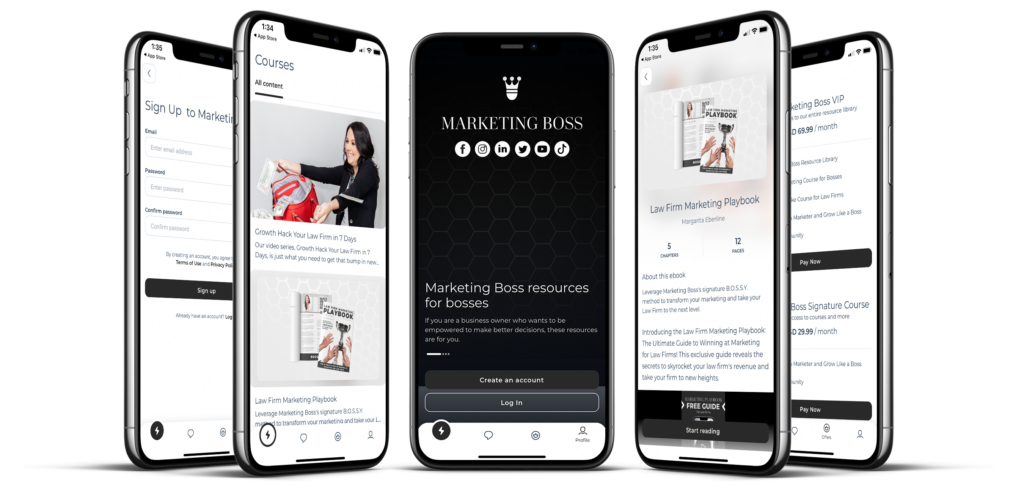Get More Out of Your Digital Ads with a Sales and Intake System for Your Law Firm
As a law firm owner investing in digital ads, you want to ensure that you get the most out of your investment. It’s important to have processes in place to convert as many leads as possible into clients. Having a CRM to follow up with potential new customers who are on the fence or who need to be further qualified is a great start. You and your team also need to be trained to connect with and qualify leads effectively whether they call your firm, fill out a form, or direct message you on the web or social media. In this article, we’ll discuss how top law firms get more out of every penny they invest in ads with sales and intake systems that turn leads into loyal clients like clockwork.
Digital leads are very different from referrals
If you are accustomed to receiving referrals that you get from friends, family, colleagues, or past clients you must note that the leads you are going to get from PPC are unlike the leads you may be accustomed to. For instance, someone referred to your law firm by a friend will likely be sold on the idea of working with you in a way that someone who stumbled upon you on Google may not be. Whereas a referral may call your law firm repeatedly until they get a hold of you because someone they trust already convinced them to work with you, a Google lead will likely call you once and forget about you as they move on to the next law firm they find on the internet.
Digital leads can connect through various channels
Digital leads can connect with you through forms on your websites and landing pages or direct message you through social media, text, or maybe even email you. When you set up your digital strategy and ads campaigns you need to consider the processes that will work best for you and your team to respond to each lead that comes in through each channel as quickly as possible.
Automation is key to success in digital lead generation
Automation can help you streamline the process of connecting with digital leads and qualify them quickly and effectively. You must have systems in place that allow your team to respond quickly to each lead while also allowing them to qualify, track, and nurture leads into clients. Using a CRM like Hubspot or Ontraport and even integrating Artificial Intelligence to generate automatic responses can help. If your PPC team adds a form to a website or landing page so that potential new customers can get in touch it is a great idea to hook it up to an automated email campaign on a CRM like Hubspot to send them an email response instantly and maybe even a few other emails later that can encourage them to sign up with your law firm. These campaigns are called drip campaigns or glide paths. They can feature emails, text messages, postcards, voice mails, and more.
You can use artificial intelligence to automate chats
Chatbots are becoming increasingly popular and have become the go-to for customer service in many industries. AI-based chatbot solutions can help your law firm respond quickly to digital leads and provide them with helpful information that will encourage them to become a client. Chatbots can be programmed to answer basic questions about how you work, and the areas of law you specialize in, and even gather information from customers that you need to qualify them as a valid lead. Chatbot software also allows customers to book appointments, and get in touch with the right lawyer for their needs. Chatbots can integrate with your website, landing pages, and social platforms like Facebook, Twitter, LinkedIn, and Instagram.
Most potential new customers will convert on the phone
Many potential new customers will call your office once they’ve interacted with your ads, even after they have filled out a form. Many will skip the forms and chats altogether and opt to call your office instead. Most law firm sales happen on the phone so having the right team in place to answer their questions and walk them through the process of signing up with your firm is key.
Gathering contact details is a must
Chances are, the people answering the phone at your law firm are not going to be attorneys who are fully capable of qualifying leads so it’s important to train them to gather contact information so you can follow up with each lead, just in case. This way, the leads are still valid even if they hang up or decide not to make an appointment when they call. Collecting contact information also allows you to build out a database of potential customers and use it for further marketing efforts. You can use your CRM (Examples: Ontraport, Mail Chimp, Hubspot) or marketing automation systems to follow up. You can send leads down various drip campaigns or glide paths depending on what the outcome of the call is.
Three critical actions
Aside from collecting data, your team should take two more critical actions on every call; reassure and connect. Every caller should be reassured that they did the right thing by calling and every caller should feel an emotional connection during the call. We should create the sense that we are either helping them with the case or giving them valuable insights so they can figure out their next steps. Every attempt should also be made to establish a human connection with the caller. This means having a conversation that builds trust with the firm, through you. You can use statements like: “I am so glad that you called” “We have helped other people just like you,” or “I am going to do everything I can to help you.”
Measurement is key
Having success on the phone requires training and measurement. You need to track calls and make note of what each person on your team can handle. How many calls are they averaging? How many of those calls are they accurately qualifying? How many of the qualified leads are signing up for the next step? In some cases that next step will be a paid or free consultation and in others, it will be to sign a contract for services. If the next step is a consultation you also want to track how many people sign up and pay and how many people actually show up. All of these metrics are known to be directly related to the quality of the interaction on the phone call.
Use software to track results
You can use call-tracking platforms or your CRM to track results. Some platforms, like CallRail, can automatically transcribe calls so that you can easily identify leads, appointments, etc. You can create tags to go through the calls and tag them as “qualified” “unqualified” etc. This can be time-consuming so we recommend delegating this to someone who understands what you are looking for so they can tag appropriately for you and provide you with a report. At Marketing Boss, call audits are a part of what we handle for clients as fractional Chief Marketing Officers (CMOs) so you know how many leads you are getting and how many of them are qualified and signing up from each source.
Follow best practices to increase conversions
There are best practices that are known to increase conversions that we teach in our Sales and Intake course for law firms. You can evaluate the way the calls are being handled by your team in these key areas. You can expect your team to sign up more cases to the degree that they are following these best practices. You can create a checklist for your team and the audit calls based on how well they follow these best practices as defined below:
Greet the caller with a warm friendly greeting in their own language
A warm and friendly greeting in the same language that the caller is likely to speak can set the call up for success. Many callers are met with cold, aloof, or greetings in a foreign language that adds tension to the interaction. What can you do if your law firm serves multiple languages? You can use a bilingual greeting. For example, if your law firm serves Spanish speakers it helps to have a greeting like “Hola. Acme Law, how can I help you? Como le puedo ayudar?” Something as simple as a warm and friendly greeting can make a caller feel more comfortable and encourage them to share important information.
Assume the sale
Many leads fail to convert because the person asking them to take the next step asks in an insecure way. You don’t want to sound overly aggressive or pushy, but you do need to make sure your tone is confident and secure. The same goes for how you state the price. Saying it matter-of-factly without apology will increase the chances that they will say yes. For example, you can ask: “Would you like a consultation?” or assume they want one by saying “Does Friday work for you at 10 AM or Monday at 9 AM for your consultation?” Your tone matters so if you find that you are nudging callers to the next steps with confident language, but they are still not converting, pay attention to your tone. Sometimes, a minor adjustment in how you ask the questions can make all the difference.
Connect with the caller on a personal level
People are more likely to do business with law firms they can trust and when they call your law firm, you and your team have an opportunity to create an emotional connection that will encourage them to work with your firm. You can do this in many ways. For starters, practice active listening. By practicing active listening, you show genuine interest in what the caller has to say and demonstrate that their concerns are important to you. During your conversations with callers, avoid interrupting or talking over them abruptly. You can still control the conversation by using connection techniques so you don’t go the other extreme and spend too much time on each call. You can say things like, “So what I am hearing is?” and then summarize the main points that pertain to the legal matter.
Use the customer’s name to establish a connection
Calling every potential new customer by their name at least once during the call is important. When someone hears their name, a chemical is released in the brain that makes them feel good and creates a connection. If you can’t pronounce or remember the caller’s name, it’s okay to ask for clarification or to let them know you want to make sure you say it correctly. Additionally, using the caller’s name shows that you are paying attention and not just treating them like a number. You can say, “My name is [tell them your name], what’s yours?” Some people have a preference for being called by a nickname or even their last name so you can ask them, “May I call you [insert their name]?” to make sure that you are calling them by a name they feel comfortable with. Using their name throughout the conversation will help the caller feel good throughout the call.
Make efforts to reassure the caller that you personally care about them, their issues, etc
Before a caller can trust a law firm, they have to be able to trust the person they are speaking to on the phone. Making it a habit to make 1-2 statements that express that you personally care can help build that trust. Use “I” statements to say things like, “I understand why this issue is important to you” or “Let me see what I can do to help you with this” or “I will make sure you get as many of your questions answered as soon as possible.” Additionally, if the caller expresses any personal concerns or emotions about their case or situation, acknowledge them and offer reassurance. For example, if a caller is scared of filing a lawsuit or taking legal action for fear of backlash you can say something like, “I understand, I will do my best to make sure you have all of the information that you need so you can make the best decision for you.
Ask questions that will help you qualify the lead
It’s important to gather all of the facts that may or may not make the case an ideal matter for your law firm. Every caller should be met with an attendant who can help them identify, at least on a superficial level, what sort of case they may have and whether it is likely to be the kind of case the law firm can and wants to take. The specific questions will vary by practice area. You should have questions documented and committed to memory to ensure that you qualify effectively and efficiently. For example, if you have a personal injury firm you should know enough about how these cases work to find out if the caller was or was not at fault with questions like: “Did you receive a citation?” or “Was there a police report?”
Treat the caller like a new potential customer or a new friend
Every caller should be treated as either a new potential customer if they have a potential case we can take or a new friend if they don’t. There will be instances where it turns out the caller is not an ideal client and in those instances, we should still aim to treat them with care and respect as we either refer them to another firm or stay in touch with them in case they need us in the future or have a loved one that we can help. It’s important to consider that every single caller could become a customer or refer us to their family and friends so there is value in building rapport and staying in touch.
Invite everyone to join the mailing list
Every caller should be invited to join the mailing list. Remarketing is a simple and inexpensive way to increase conversions and referrals over time from every caller. Giving people notice that we have a mailing list and asking them to verbally opt-in or agree will make them more likely to welcome any follow-up efforts we want to make later either through automation or old-fashioned outreach. Additionally, having a mailing list of interested individuals who have verbally agreed to receive communications from the law firm will help ensure compliance with important email and text marketing regulations outlined in the CAN-SPAM Act.
Express empathy
Empathy can come across in the tone of voice and in how you navigate the conversation. A few simple ways you can create a sense of empathy is to listen actively and to make statements that acknowledge how people are feeling like, “I hear you,” “I can see how this must be difficult for you,” or “I am so glad that you called us, I am going to do everything I can to help you.” Additionally, it’s important to validate the caller’s feelings and concerns by restating them back to them. This shows that you are truly listening and understanding their perspective. An empathetic attendant can help calm a distressed caller and build trust in a law firm.
Establish the value of the services before discussing the next step or the price
Knowing when to ask the caller to take the next step is important. Timing “the ask” is almost as important as the way you deliver “the ask,” whether it’s to book a free or paid consultation or sign an agreement for services. You want to ensure that before you ask the caller to take the next step you have convinced them of the value of the services and built trust. If the caller is either excited or relieved then it’s usually a sign that they feel trust and see the value.
When establishing the value of legal services, it’s important to highlight how you can solve their problem or meet their needs. This could be through discussing previous successful cases or highlighting specific skills and experience that your firm possesses. Take the time to do this even if the caller wants to jump right into a discussion about the next steps and price. You can say things like, “We can certainly talk about that but first, let me tell you…” and proceed to make statements to build up the value and build trust. It may seem counterintuitive to delay “the ask” when the caller is asking for it but jumping into the next steps and pricing too early can make it more likely that you will get a caller who either says “no” or says “yes” but does not actually follow through.
If you have ever experienced no-shows at your law firm who book appointments and then don’t show up or callers who agree to move forward but then ghost the firm or don’t pay it’s usually because they were not sold on value and trust thoroughly enough. This is known as a “yes without commitment”. A caller may agree but if they don’t feel confident or are not convinced enough to take action, they won’t actually follow through. Therefore, it’s crucial to establish the value of services before discussing the next step or price. This will increase your conversion rate and decrease the number of people who say yes and don’t really mean it. As an added bonus, clients who engage a law firm that they trust and value tend to be easier clients to manage. They will be less likely to question everything, challenge recommendations, and get impatient throughout their case.
Establishing that the law firm is the best
Making one or two statements that establish that your law firm is the best choice on every call can go a long way. Even if callers don’t ask, they should hear about the law firm’s accolades that make them either the best in the industry or the best fit for the caller. For example, if the caller is looking for a family law attorney and the firm has won awards for its expertise in that practice area, then mention it. This builds credibility and trust immediately.
Additionally, you should have a clear understanding of what sets the law firm apart from others. Whether it’s specialized experience in a certain practice area or exceptional client satisfaction rates. It helps to have a list of things that anyone can mention to callers on hand, and if possible, memorized so that every caller hears about at least one or two things that make your law firm the best.
Complimenting the person or people that the caller will meet with next
Make a strong impression with potential new customers and set up the team that will seal the deal by following this crucial step. When your sales process involves signing a contract and paying fees with someone other than the initial point of contact, such as the receptionist, it’s important to build trust with the closer beforehand. For example, if your law firm has an initial consultation with potential clients, have the receptionist compliment the attorney they will be meeting with for that consultation. This creates a positive atmosphere and sets the stage for a smoother agreement. By fostering positive feelings and expectations, potential clients are more likely to trust and sign up with ease.
Attorneys can certainly share their own accolades and expertise with potential new customers they meet when they meet them but hearing about those qualities from someone else, lands differently. There is a psychological effect that comes from hearing someone else talk highly of someone. This is why the attendant needs to mention any awards or recognition our law firm has received, as well as positive feedback from previous clients. It helps to establish credibility and build a positive image in the caller’s mind about the upcoming meeting with the attorney who will be asking them to sign up with the firm.
So, be sure to train attendants and receptionists to speak well of your attorneys ahead of time and provide them with information about the strengths and qualities of the attorneys they work with. This allows them to confidently speak about their colleagues and highlight their expertise, making callers feel more comfortable and assured about their upcoming meetings. If the attendant has built rapport with the caller, they can transfer some of that trust to the rest of the law firm by complimenting the team members that the client will interact with.
So if your law firm has a step where potential new clients speak to an intake person before they speak with an attorney, you can apply the same techniques to build up that staff member as well. Really any time you introduce a potential new customer to anyone at your firm, they should be talked up.
Ask the potential new customer to write down important information
The act of writing down important information will encourage callers to follow through with their decision to meet with your team, provide important documents, and more. Your team should ask them to write down information pertaining to any important actions you want them to take like sending you documents, filling out paperwork, or showing up to your office for an appointment at a specific date and time. You can politely say, “I’ll give you a minute while you put that in your calendar” or “I’ll give you a minute while you write that down.” Having the caller write down their appointment and any important instructions you give them also ensures that they have the correct information and avoids miscommunication. This small step can save a lot of time in rescheduling, chasing down information, or correcting misunderstandings.
Be prepared to overcome objections
Handling objections is an essential skill for any successful call with a potential new customer. It is best to avoid objections in the first place by building up the value of your legal services and establishing trust before asking the caller to take the next step of booking a consultation or signing a contract. One clue that the caller is likely to say yes without any objections and actually mean it is if they are excited or in some cases relieved to have called and are asking how they can get started with their case.
Assuming that you have done everything to qualify the lead, build trust and value, and the potential new customer objects to the next step you ask them to take, it is still possible to turn the objection into a yes. When a qualified lead objects, it simply indicates that there are concerns that you have not addressed that may have simply not been articulated in the conversation.
Try to figure out why they are objecting in as much detail as possible so you can tackle each objection effectively. If they say “no” but don’t give you a reason you can use open-ended questions like, “Can you tell me more?” or “What concerns do you have?” to gather more information.
Address each concern individually once you have more information. It’s important to remember that objections can differ depending on the practice area, so it’s impossible to predict how to respond to everyone. However, there are a few common objections, such as price and timing, that you can be ready to address.
Pricing objections
If a potential new customer cites price as an objection, then it’s usually because they are not sold on the value that the law firm’s services will bring in comparison to the fees they are being asked to pay. There are two common reasons for this and gauging which one it is will help you respond. Is the lack of perceived value because they don’t see how good your services are and how much you care? Or is the lack of perceived value because they don’t see the legal matter as enough of a threat worth handling at the costs you are proposing? Depending on which, you will need to remind the caller of your expertise, experience, and past successes or reframe the situation by highlighting potential consequences if they don’t take action. Try explaining the value they will receive from your legal services and how it can potentially save them time and money in the long run. Financial reasons are usually less about the money and more about the perceived value. So treat financial objections as a sign that there is a lack of trust, credibility, perceived value, or sense of urgency.
On the rare occasion that the issue is really money, you can try sharing creative financial strategies that other customers have used to finance the legal services and you can also offer payment plans or alternative options if available. It’s important to remain confident, understanding, and helpful during these conversations. Remember, you are not only selling your legal services but also building a relationship with the potential new customer.
Timing objections
Another common set of objections is around timing. Some callers may say they need more time to think about it or they are not ready to make a decision just yet. In this case, empathize with their concerns and ask them questions to get more insights. You can apply gentle pressure for them to reveal what’s really holding them back by asking “How much time do you need?” and then asking them to think about what can happen between now and that time frame, what potential threats are there, and what opportunities exist by taking action now instead. For example, say you are a divorce law firm and the caller says they need to think about it but has also shared that their spouse has already filed and served them with papers and now they have 30 days to respond. You can point out that if they hire you now, you will have a better chance of helping them file a stronger response by the deadline than if they continue to think about it and leave you with a smaller window to prepare a legal strategy and respond by the deadline.
These are two of the most common types of objections. You should keep a list of the most common objections that are specific to your law firm callers, test different strategies to overcome them, and then standardize the way objections are handled at your firm based on what works best.
No matter what sort of objection you are dealing with, understanding the deeper reasons behind objections is key to successfully overcoming them. By gathering more information and addressing specific concerns, you can effectively present the value of your legal services to potential customers. This can involve highlighting your expertise, building trust, or simply asking questions that can help the caller think through their own concerns out loud with you as you help them navigate their objections.
Partner with your digital ads team
Having a robust sales and intake system in place that incorporates these best practices can help you work better together with your digital ads team or PPC vendor. Investing in digital ads for your law firm can represent a significant investment for you and your vendor however the number of cases you will sign up from your ads will rely heavily on how well your law firm handles every lead. That is why it is essential to have a sales and intake system in place to help you get the most out of your investment. If you don’t have a system or are wondering if your current system needs improvement, start by tracking your team’s ability to sign up cases, audit their calls against the best practices we outlined above, and take steps to fill in any skill gaps you find. Remember that by implementing a system that features these best practices, you’ll not only convert more leads into clients, but you’ll also build long-lasting client relationships.
To learn more about these best practices and for help building a robust sales and intake system for your law firm please visit www.marketing-boss.com where you will find information on our Fractional CMO Services for law firms. You can also download our app for access to our sales and intake course for law firms on Apple and Android.
Access our Sales Course for Law Firms on
Our
App
Our App







